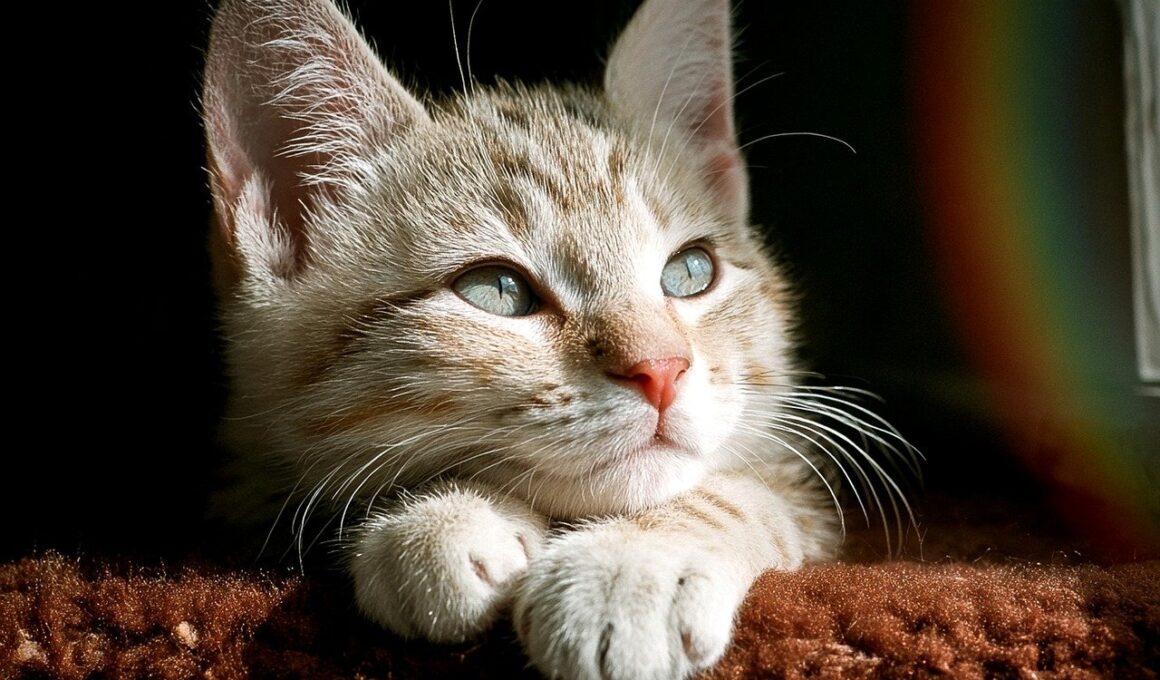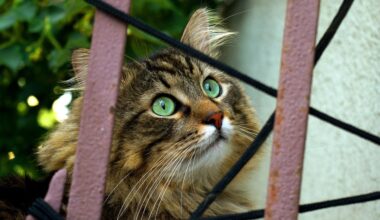How Early Exposure to Different Environments Shapes Cat Behavior
The environment in which a cat grows up significantly impacts its behavior, emotional health, and social interactions. Early life experiences shape their responses to various stimuli and their overall adaptability to new or stressful situations. Kittens undergoing diverse experiences during their formative weeks are likely to grow into well-adjusted adults. This early exposure positively influences behaviors such as curiosity, playfulness, and sociability. In contrast, kittens with limited experiences may become fearful, anxious, or overly aggressive later in life. It is crucial to provide proper socialization and exposure to different sights, sounds, and smells. These experiences allow kittens to learn how to navigate the world safely and effectively. Social interactions with other pets, people, and even different environments can help them respond positively to new situations. Additionally, consulting with a veterinarian or a cat behaviorist during this period could enhance the qualities of early exposure by ensuring safety and proper social experiences. Understanding the impact of early life experiences on behavior can help caretakers cultivate environments that foster healthier, happier cats. It’s a fundamental aspect of responsible pet ownership.
One primary factor affecting cat behavior is their exposure to various stimuli early in life. Kittens raised in environments that encompass diverse experiences generally thrive compared to those in static settings. A rich environment can promote confidence and adaptability. Conversely, insufficient exposure can lead to issues such as anxiety or aggression. For example, cats introduced early to different sounds, like vacuum cleaners or doorbells, are less likely to react negatively later on. Early experiences play a role in how they perceive their living space and their overall sense of security. Additionally, socialization with both animals and humans during this period is crucial in promoting positive cat behavior. Kittens that interact with various creatures develop better social skills. On the other hand, isolation can lead to fearfulness and apprehension around others. Moreover, observing their mother interact with different elements in the environment also influences their learning and adaptation process. Ensuring cats have these experiences can significantly shape their behavior. This exposure can ultimately lead to healthier emotional states and well-adjusted adult cats. Caregivers play a fundamental part in this critical development stage.
The Role of Socialization in Behavioral Development
Socialization during early life stages contributes immensely to feline behavior and personality. A cat’s propensity for playfulness or aggression often stems from interactions within its first few weeks of life. Effective socialization helps kittens become more confident and less skittish in their adult lives. Engaging kittens with other cats, gentle dogs, and human family members allows them to learn appropriate social cues. Kittens benefit from observing interactions, which helps them navigate social situations more successfully as adults. Lack of such experiences can predispose them to fearful or hostile reactions towards unfamiliar beings. Owners can facilitate this socialization by organizing playdates or introducing kittens to various environments gradually. The experiences during this crucial growth phase mold their attitudes towards other pets and people. Furthermore, monitoring these interactions is important to ensure they are positive and non-threatening. This exposure can lead to a healthy development where the cat is more accommodating and friendly with visitors and other pets. Thus, investing effort into this vital developmental stage can bring rewards of a well-adjusted pet in the long run.
Another significant aspect is environmental enrichment, which greatly influences a cat’s well-being. Environmentally rich surroundings stimulate a cat’s senses, keeping them engaged and mentally active. Incorporating various textures, objects, and climbing structures can lead to healthier, happier cats. Providing toys that challenge their intellect helps counter boredom, which can lead to destructive behavior. Cats benefit immensely from having a variety of toys: feathered wands, balls, and puzzle feeders encourage problem-solving. Such stimulation is crucial, especially for indoor cats, as they lack the experiences outdoor cats might encounter. A lack of environmental enrichment can increase stress levels and result in behavioral issues. It’s advisable to rotate toys and create various play routines to maintain the cat’s interest. Moreover, providing safe outdoor environments to explore, like enclosed catios, can enhance their social and environmental experiences. Exploring new surroundings helps kittens develop confidence and adaptability. Engaging with their environment fosters a sense of security, ultimately shaping their behavior positively. Caretakers should prioritize creating an enriching environment for their feline companions throughout their early lives.
Impact of Neglect on Cat Behavior
Neglect during a cat’s early life can have devastating consequences on their behavior and overall well-being. Cats that experience a lack of maternal care and social interaction often display behavioral problems such as aggression or excessive anxiety. They may struggle with trust issues towards humans and other animals while exhibiting withdrawn behaviors. Such outcomes can lead to chronic stress, affecting their health and emotional stability. Conditions resulting from neglect often manifest as litter box problems, destructive tendencies, and overreaction to stimuli. Early social deprivation stifles their ability to adapt to new situations. These cats may become fearful and show hostile responses to simple household activities or visitors. Owners should be aware of this impact and work actively to create a supportive environment. For those taking in rescue cats, patience and gradual exposure are fundamental to rebuilding trust. One helpful approach is offering slow introductions to new environments and situations. This process allows these cats to feel safe and learn to engage with the world positively. Understanding a neglected cat’s past experiences is crucial to guiding their behavioral development effectively.
Cats raised in loving, stable homes exhibit various positive behaviors that indicate their well-being. These behaviors include friendliness, social interaction, and curiosity about their surroundings. A nurturing environment provides a foundation for emotional health, enabling kittens to establish secure attachments. This sense of security fosters independence while allowing them to feel safe exploring their environment. Positive early experiences contribute to a greater propensity for playfulness and exploration, enhancing their overall quality of life. Moreover, a confident cat actively participates in home life, interacting positively with family and other pets. Behaviorally well-adjusted cats tend to engage in healthy play and reduce instances of stress-related reactions. Introductions to various people and situations can lead to more adaptable behaviors in adulthood. Regular engagement and interaction promote a sense of routine and comfort in their lives. Additionally, offering positive reinforcement when cats exhibit desirable behaviors can lead to lasting good habits. Investing time and effort into early experiences shapes a cat’s adult behavior, allowing owners to enjoy a fulfilling companionship. Thus, understanding the significance of a supportive environment cultivates a harmonious relationship between humans and their feline friends.
Conclusion: The Lasting Effects of Early Life Experiences
In conclusion, understanding cat behavior through the lens of early life experiences is essential for pet owners. The early environment significantly dictates the course of a cat’s behavior throughout its life. Experiences obtained from varied stimuli, social interactions, and a nurturing atmosphere blend to shape their personalities. Kittens exposed to diverse environments tend to grow into confident, sociable adults. In contrast, those with limited or negative early experiences can develop behavioral challenges that endure throughout their lives. Recognizing the importance of fostering excellent early environments ensures that cats develop positive characteristics. Pet owners must prioritize socialization and environmental enrichment during their cat’s formative weeks. Also, awareness of the impact of neglect on kittens can serve as a guide in ensuring humane treatment. By addressing these factors, caretakers can cultivate healthier relationships and companionship with their furry friends. Based on this understanding, the actions taken by owners and caregivers during the critical early stages can lead to lifelong positive behavior. Emphasizing early exposure, socialization, and enriching environments allows for a happy, healthy feline family member.
Learning how early environment shapes behavior is vital for cat lovers. Ensuring a nurturing atmosphere leads to fulfilling relationships with feline companions. Supporting a cat’s development through proper exposure during early life is a commitment that yields rewarding returns.


